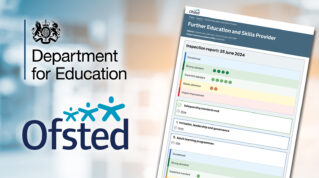FE colleges and providers will be judged on a colour-coded five-point grading scale from “exemplary” to “causing concern” across potentially 20 areas under Ofsted’s new report cards – double the number in current reports.
The watchdog has come under early fire for the plan unveiled today, with one union claiming this system will introduce a de facto new league table that “appears to be even worse” than the single-phrase judgments they replace and less “humane”.
Ofsted’s consultation confirms that overall effectiveness judgments will be removed but multiple areas will be cast as either ‘exemplary’, ‘strong’, ‘secure’, ‘attention needed’ and ‘causing concern’. This replaces the current ‘outstanding’, ‘good’, ‘requires improvement’ and ‘inadequate’ grades.
FE providers will be judged on seven headline areas: leadership, inclusion, safeguarding, curriculum, developing teaching and training, achievement, and participation and development.
The latter four areas will also receive one of the judgments for each of the following types of provision offered: education programmes for young people, provision for learners with high needs, apprenticeships and adult learning programmes.
So for an FE college offering courses to young people, adults, apprentices and learners with high needs, this would see the number of grades they receive double from ten to 20.
Colleges will also continue to be judged on whether their contribution to meeting skills needs is ‘limited’, ‘reasonable’, or ‘strong’.
As well as headline grades for each area, Ofsted will publish short descriptions summarising their findings.

New hurdles ‘bewildering for teachers and leaders’
Ofsted said this system will allow inspectors to “highlight success when things are working well, provide reassurance that leaders are taking the right action where improvement is needed, and identify where more urgent action is required to avoid standards declining”.
And, as well as “giving more nuanced information”, this approach will “help reduce pressure on staff – by presenting a balanced picture of practice across more areas, not a single overall grade”, the watchdog claimed.
But whistleblowers from Ofsted contacted FE Week’s sister title last week to warn the consultation is a “sham” and new inspection report cards have been “cobbled together at ridiculous speed” with no underpinning research and concerns by experienced officials ignored.
Pepe Di’Iasio, general secretary of the Association of School and College Leaders, said today that Ofsted and the government “appear to have learned nothing” from the death of headteacher Ruth Perry, which is why the changes are being made, and have instead “devised an accountability system which will subject a beleaguered profession to yet more misery”.

He believes that the system of applying five new judgments to a range of performance areas creates a “set of hurdles which will be bewildering for teachers and leaders, never mind the parents whose choices these reports are supposedly intended to guide”.
Di’Iasio added: “We would question whether it is possible to reach with any degree of validity, in the course of an inspection, such a large number of conclusions – all of which are critical to those being inspected and where judgements may be finely balanced between categories. It is certainly a recipe for systemic inconsistency.”
Ofsted said that in parallel with today’s consultation, the Department for Education is consulting on proposed changes to intervention and support in maintained schools and academies.
The watchdog was however unaware of plans for how FE intervention will be impacted by the new-style report cards. Currently, the DfE uses Ofsted judgments to decide whether to terminate apprenticeship provider contracts and whether to place colleges into FE Commissioner intervention.
Ofsted’s consultation suggests a return to a heavy focus on data, with providers warned that they will score the two lowest judgments in the “achievement” category if their achievement rates are “below comparable national rates, based on learners’ starting points”.
Other contextual data to be used in inspections and reports include learner characteristics, performance outcomes, absence and attendance figures, and local area demographics.
‘Worse than single-word judgments’
The consultation will run for 12 weeks until April 28, with more pilot inspections due to be carried out in coming months, before Ofsted publishes its final response in the summer.

A new inspection framework will then be introduced in September, with the return of inspections after the summer break delayed until November to allow for trialling of the new model and inspector training.
Daniele Kebede, general secretary of the National Education Union, said the proposals “will make matters worse, not better”. He said new chief inspector Martyn Oliver “has failed to deliver” the changes needed, and “has ignored the voice of the profession”.
“He has set a course for Ofsted to remain just as out of touch as before, just as crude in its assessments,” Kebede added, saying the proposed grading scale “maintains the current blunt, reductive approach that cannot capture the complexity” of an education provider’s “life nor provide more meaningful information to parents”.
Di’Iasio added: “School and college leaders had high hopes that an approach to inspection based on report cards might be more nuanced and humane. Sadly, the way in which Ofsted and the government are going about this suggests that the opposite will be the case.”
Click here for our speed-read on the new grades and inspection categories
















It looks very much like replacing single word judgements from a four point scale, with single word judgements from a five point scale.
You don’t have to go back too far when it was a single word judgements based on a five point scale being replaced with a four point scale.
The numbers 3 & 6 are probably wondering what they have to do to get a look in!